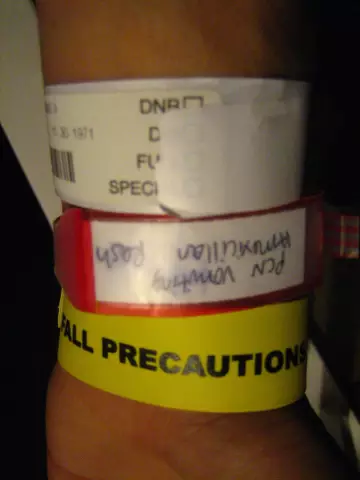Medical terms
Last modified: 2025-11-02 20:11
Amblyopia (amblyopia; Greek amblyopia; Greek amblys - weak, dull + opos, ops - eye) - decreased vision, which is caused by functional disorders of the visual analyzer
Last modified: 2025-11-02 20:11
Amenorrhea (amenorrhoea; a- - negative part + Greek men - month + rhoia - expiration, flow) - absence of menstruation for 6 months or more
Last modified: 2025-11-02 20:11
Ametropia is one of the refractive errors of the eye, in which the correspondence between the length of the optical axis of the eye and the refractive power of its optical system is disturbed
Last modified: 2025-11-02 20:11
Amylase is the general name for enzymes of the class of hydrolases that catalyze the hydrolysis of starch, glycogen and related oligo- and polysaccharides, proceeding by cleavage of glycosidic bonds between carbon atoms
Last modified: 2025-11-02 20:11
Amyloidosis (amyloidosis; Latin amylum, Greek amylon - starch + Greek eidos - type + Greek -ōsis (word-form suffix) - disease; synonym: amyloid dystrophy) - extracellular dysproteinosis, which is characterized by the deposition of paramyloid in tissues
Last modified: 2025-11-02 20:11
Aminoaciduria - increased excretion of one or more amino acids in the urine or the presence in the urine of their metabolic products, which are not normally contained in it
Last modified: 2025-11-02 20:11
Amino acids (synonym: aminocarboxylic acids) - carboxylic (organic) acids that contain one or more amino groups
Last modified: 2025-11-02 20:11
Amnesia (amnesia; Greek amnesia - memory loss, forgetfulness) is one of the memory disorders, manifested in the form of a loss of the ability to retain and reproduce previously acquired knowledge
Last modified: 2025-11-02 20:11
Ampoule II is a term used in anatomy. Ampula is an enlarged part of a tubular organ (intestine, duct, semicircular canal)
Last modified: 2025-11-02 20:11
Amputation I - a surgical operation to cut off a limb or its peripheral part with crossing (biting, sawing) bones or removing an organ (breast, uterus, penis)
Last modified: 2025-11-02 20:11
Analyzer I is an anatomical and physiological education that provides the analysis and perception of information about phenomena occurring within the organism itself and / or in the environment, and forms sensations specific to this analyzer
Last modified: 2025-11-02 20:11
Analyzer II is the general name for instruments used in the automatic analysis of quantitative and qualitative characteristics of certain processes, composition and properties of any substances
Last modified: 2025-11-02 20:11
Anamnesis (anamnesis; Greek anamnesis - memory) - a set of data obtained during a medical examination by interviewing the patient and / or people who know him
Last modified: 2025-11-02 20:11
Anastomosis I in anatomy - the natural union of two hollow organs
Last modified: 2025-11-02 20:11
Anastomosis II (anastomosis; synonym: anastomosis) in surgery - communication between hollow organs, body cavities or blood vessels, created by surgery
Last modified: 2025-11-02 20:11
Anatomical nomenclature (nomina anatomica; lat.nomenclatura - list, list) - a systematic list of anatomical terms
Last modified: 2025-11-02 20:11
Anatomy is a biomedical science that studies the structure and shape of the body of humans and animals, as well as its constituent organs in connection with their development and function
Last modified: 2025-11-02 20:11
Anaphylaxis is an immediate-type allergic reaction that occurs with parenteral administration of an allergen
Last modified: 2025-11-02 20:11
Anhidrosis (anhidrosis; an- - negative prefix + Greek hidros - sweat) is a pathological condition characterized by the absence of sweating
Last modified: 2025-11-02 20:11
Angina is an acute infectious disease caused by staphylococci or streptococci, in more rare cases - by other microorganisms
Last modified: 2025-11-02 20:11
Angiopathy - a violation of the tone of the blood vessels, which is caused by a disorder of nervous regulation
Last modified: 2025-11-02 20:11
Anetoderma is a dermatosis of unknown etiology, characterized by the formation of foci of atrophy of the subcutaneous tissue and epidermis with a diameter of up to 15 mm, "pasty" consistency
Last modified: 2025-11-02 20:11
Anisometropia (anisometropia; Greek anisos - unequal + Greek metron– measure + opos, ops - eye; synonym: heterometropia) - a condition in which the refraction of the left and right eyes is not the same
Last modified: 2025-11-02 20:11
Antagonism I - a type of interaction in the body of substances, characterized by the fact that due to one of them the effect of the other is weakened
Last modified: 2025-11-02 20:11
Antiseptics is a set of therapeutic and prophylactic measures aimed at destroying microbes in wounds, other pathological formations or the body as a whole
Last modified: 2025-11-02 20:11
Anuria (anuria; an- - negative part + Greek uron - urine; synonym: anuresis) - non-entry of urine into the bladder
Last modified: 2025-11-02 20:11
Aortitis is an inflammatory process of the walls of the aorta, manifested by aorthalgia, enlargement of the aorta, and with a productive inflammatory process in the places where large arteries leave the aorta - symptoms of ischemia of the corresponding areas
Last modified: 2025-11-02 20:11
Anatomical apparatus II (apparatus) - a functional association of different in structure and origin of individual organs or systems of the body
Last modified: 2025-11-02 20:11
Appendicitis is an inflammatory process of the appendix of the cecum
Last modified: 2025-11-02 20:11
Apraxia - violations of purposeful action against the background of the safety of its constituent elementary movements
Last modified: 2025-11-02 20:11
Pharmacy - an institution where medicines, sanitation and patient care items, dressings are stored, prepared and dispensed
Last modified: 2025-11-02 20:11
First-aid kit - a set of medicines, dressings and other medical supplies, which is assembled in a special packing; intended for first aid, including self-help and mutual aid
Last modified: 2025-11-02 20:11
Arachnoiditis is an inflammatory process occurring in the pia mater of the spinal cord or brain with a predominant lesion of the arachnoid
Last modified: 2025-11-02 20:11
Arrhythmia of the heart is a name that combines violations of the formation of an excitation impulse or its conduction through the myocardium
Last modified: 2025-11-02 20:11
Arnold's ganglion cardiac middle - sympathetic ganglion, is inconsistently found in the thickness of the middle cardiac cervical nerve
Last modified: 2025-11-02 20:11
Arterial pressure - the pressure that the blood in the artery exerts on its wall; determined by the value of cardiac output, total peripheral vascular resistance to blood flow and the state of the arterial walls
Last modified: 2025-11-02 20:11
Arteritis (arteriitis; Greek aer - air + Greek tereo - contain + Latin it (word-form suffix) - inflammatory process) - inflammation of the artery walls
Last modified: 2025-11-02 20:11
Arteriography (Greek aer - air + Greek tereo - contain + Greek grapho - to depict, write) - X-ray examination of the arteries, carried out after the introduction of a contrast agent into their lumen
Last modified: 2025-11-02 20:11
Arthritis (arthritis; Greek arthron - joint related to the joint + Latin it (word-form suffix) - inflammatory process) - inflammation of the joint or some of its elements
Last modified: 2025-11-02 20:11
Aspergillosis (aspergillosis) - mycosis, which is caused by parasitic fungi of the genus Aspergillus








































